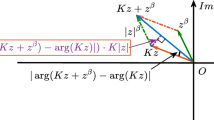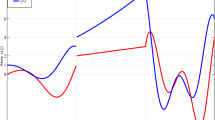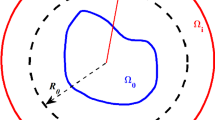Abstract
In this paper, we consider a diffusion equation with fractional time derivative with nonsingular Mittag-Leffler kernel in Hilbert spaces. We first prove the existence and uniqueness of solution by means of a spectral argument. Then, we consider a distributed controlled fractional diffusion problem. We show that there exists a unique optimal control, which can act on the system in order to approach the state of the system by a given state at minimal cost. Finally, using the Euler–Lagrange first-order optimality condition, we obtain an optimality system, which characterizes the optimal control.
Similar content being viewed by others
References
Metzler, R., Klafter, J.: The random walk’s guide to anomalous diffusion: a fractional dynamics approach. Phys. Rep. 339(1), 1–77 (2000)
Schneider, W.R., Wyss, W.: Fractional diffusion and wave equations. J. Math. Phys. 30(1), 134–144 (1989)
Lei, S.-L., Sun, H.-W.: A circulant preconditioner for fractional diffusion equations. J. Comput. Phys. 242, 715–725 (2013)
Wang, H., Wang, K., Sircar, T.: A direct \(O(N\log ^2N)\) finite difference method for fractional diffusion equations. J. Comput. Phys. 229, 8095–8104 (2010)
Mophou, G.: Optimal control of fractional diffusion equation. Comput. Math. Appl. 61, 68–78 (2011)
Sakamoto, K., Yamamoto, M.: Initial value/boundary value problems for fractional diffusion-wave equations and applications to some inverse problems. J. Math. Anal. Appl. 382, 426–447 (2011)
Choi, J.H., Rim, H., Sakthivel, R.: On certain exact solutions of diffusive predator-prey system of fractional order. Chin. J. Phys. 54, 135–146 (2016)
Agrawal, O.P.: A general formulation and solution scheme for fractional optimal control problems. Nonlinear Dyn. 38, 323–337 (2004)
Agrawal, O.P.: Formulation of Euler–Lagrange equations for fractional variational problems. J. Math. Anal. 272, 368–379 (2002)
Frederico, G.S.F., Torres, D.F.M.: Fractional optimal control in the sense of caputo and the fractional Noether’s Theorem. Int. Math. Forum. 3(10), 479–493 (2008)
Kilbas, A.A., Srivastava, H.M., Trujillo, J.J.: Theory and Applications of Fractional Differential Equations. Elsevier, Amsterdam (2006)
Samko, S., Kilbas, A.A., Marichev, O.: Fractional Integrals and Derivatives. Taylor & Francis, London (1993)
Jin, B., Lazarov, R., Zhou, Z.: Error estimates for a semi-discrete finite element method for fractional order parabolic equations. SIAM J. Numer. Anal. 51(1), 445–466 (2013)
Atangana, A., Baleanu, D.: New fractional derivatives with non-local and non-singular kernel: theory and application to heat transfer model. Thermal Sci. 20(2), 763–769 (2016)
Djida, J.D., Atangana, A., Area, I.: Numerical computation of a fractional derivative with non-local and non-singular kernel. Math. Model. Nat. Phenom. 12(3), 4–13 (2017)
Abdeljawad, T., Baleanu, D.: Integration by parts and its applications of a new nonlocal fractional derivative with Mittag-Leffler nonsingular kernel. J. Nonlinear Sci. Appl. 10, 1098–1107 (2017)
Podlubny, I.: Fractional Differential Equations. Academic Press, San Diego (1999)
Bazhlekova E.: Fractional Evolution Equation in Banach Spaces. Ph.D. Thesis. Eindhoven University of Technology (2001)
Diethelm, K., Luchko, Y.: Numerical solution of linear multi-term initial value problems of fractional order. J. Comput. Anal. Appl. 6, 243–263 (2004)
Djida J.D., Atangana A., and Area I.: Parabolic problem with fractional time derivative with nonlocal and nonsingular Mittag-Leffler kernel. arXiv:1701.01479 (2017)
Baleanu, D., Joseph, C., Mophou, G.: Low regret control for a fractional wave equation with incomplete data. Adv. Differ. Equ. 1, 240 (2016)
Acknowledgements
The first author is grateful for the facilities provided by the German research Chairs and the Teacher Training Program of AIMS-Cameroon. The first author is also indebted to the AIMS-Cameroon 2017–2018 Tutor fellowship. The second author was supported by the Alexander von Humboldt foundation, under the program financed by the BMBF entitled “German research Chairs”. The work of the third author has been partially supported by the Agencia Estatal de Innovación (AEI) of Spain under Grant MTM2016-75140-P, cofinanced by the European Community fund FEDER, and Xunta de Galicia, Grant R 2016/022. Besides the authors are grateful to the unknown referees for their valuable suggestions.
Author information
Authors and Affiliations
Corresponding author
Appendix: Proof of Proposition 2.1
Appendix: Proof of Proposition 2.1
Let \(\phi , y \in {\mathcal {C}}^{\infty }({\bar{Q}})\) be given. Then,
Let us compute each part separately.
-
Computation of (A): By using the definition of the Atangana–Baleanu fractional derivative (1) at the base point \(a=0\) we have
$$\begin{aligned} \int _{0}^{T} {}^{abc}_{0} \mathbf D ^{\alpha }_{t}~y(x,t)\phi (x,t)\hbox {d}t = \int _{0}^{T} \left[ \frac{B(\alpha )}{1-\alpha } \int _{0}^{t} y'(\tau ) E_{\alpha } \left[ -\gamma (t-\tau )^{\alpha } \right] \hbox {d}\tau \right] \phi (t)\hbox {d}t.\nonumber \\ \end{aligned}$$(29)
Let us define \(A_{1} := \int _{0}^{t} y'(\tau ) E_{\alpha } \left[ -\gamma (t-\tau )^{\alpha } \right] \hbox {d}\tau \). By using integration by parts it yields
Replacing \(A_{1}\) by its value in (29) we get that
with
Let us compute \(A_{4}\)
Hence, replacing \(A_{4}\) by its value in (30) we finally have that
-
Computation of (B) By a using integration by parts we have that
$$\begin{aligned} (B):= & {} \displaystyle -\int _{\varOmega }\int _{0}^{T}\phi (x,t)\Delta u(x,t) \hbox {d}x~\hbox {d}t = \int _{0}^{T} \int _{\partial \varOmega } u \frac{\partial \phi }{\partial \sigma } \phi \hbox {d}\sigma ~\hbox {d}t \nonumber \\&- \int _{0}^{T} \int _{\partial \varOmega } \phi \frac{\partial u}{\partial \sigma } \hbox {d}\sigma ~\hbox {d}t \nonumber \\&\displaystyle - \int _{\varOmega }\int _{0}^{T}u(x,t) \Delta \phi (x,t)\hbox {d}t~\hbox {d}x. \end{aligned}$$(32)
Hence, by adding (31) to (32), we obtain the desired result (5).
Rights and permissions
About this article
Cite this article
Djida, JD., Mophou, G. & Area, I. Optimal Control of Diffusion Equation with Fractional Time Derivative with Nonlocal and Nonsingular Mittag-Leffler Kernel. J Optim Theory Appl 182, 540–557 (2019). https://doi.org/10.1007/s10957-018-1305-6
Received:
Accepted:
Published:
Issue Date:
DOI: https://doi.org/10.1007/s10957-018-1305-6
Keywords
- Mittag-Leffler functions
- Time-fractional differential equation
- Optimality system
- Euler–Lagrange optimality conditions




